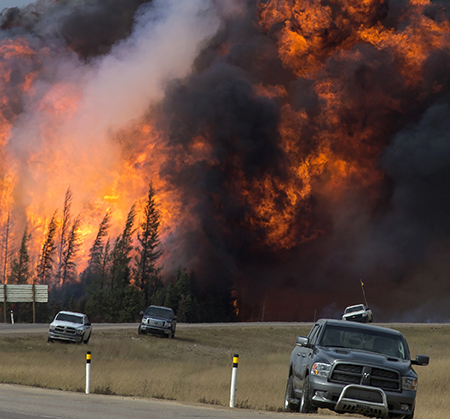Nearly 40,000 British Columbians have been displaced due to wildfires in B.C. As the province heads into the third week of what is expected to be a long and destructive wildfire season, UBC professors discuss the psychological impact of wildfires.
Steven Taylor, a Professor in the Department of Psychiatry, specializes in anxiety disorders and post-traumatic stress disorder.
What are the psychological impacts of having to flee a wildfire or losing your home to wildfires?
The impact varies according to a range of complex factors including the nature of the loss, the degree of impact and disruption on their lives, the aftermath, the person’s age and their level of psychological adjustment. Most people cope well with losses, although they may experience some degree of distress such as anxiety, depression or sleep disturbance. Grieving the loss of one’s cherished possessions is a natural psychological reaction, although most people are able to move on with their lives. If emotional problems with anxiety or depression persist for more than two to four weeks after the event then it is important to consult a mental health professional such as a psychologist or a psychiatrist.
Post-traumatic stress disorder (PTSD) is a possibility for people who perceived that their lives, or the lives of loved ones, were in acute danger. However, most people are resilient to stress and do not develop PTSD.
Substance abuse and marital or family conflict are also potential consequences of a serious stressor such as a major forest fire, especially in people who have preexisting issues.
What about the impact on firefighters?
Firefighters, just like police officers and military personnel, are at greater risk of developing PTSD, compared to the general population. This is mainly because if you work in a dangerous profession then your odds are increased of being exposed to traumatic events. Fatigue and emotional burnout are also important concerns, especially for those who have been working long, dangerous shifts fighting forest fires. It is important for firefighters to be mindful of their mental health; if they are experiencing significant anxiety, depression, irritability or anger, then they may need to take some time to attend to their mental health.
What about those of us who are not directly impacted by the fires?
Some people may become distressed by news reports of forest fires, but the overwhelming majority of people are not emotionally impacted by these events. In fact, the opposite is more likely. By being exposed to daily news reports of natural disasters, wars, and violence, the viewer can become desensitized. Of course, being “numbed out” to the suffering of others is a concern in itself, but that is a different topic.
